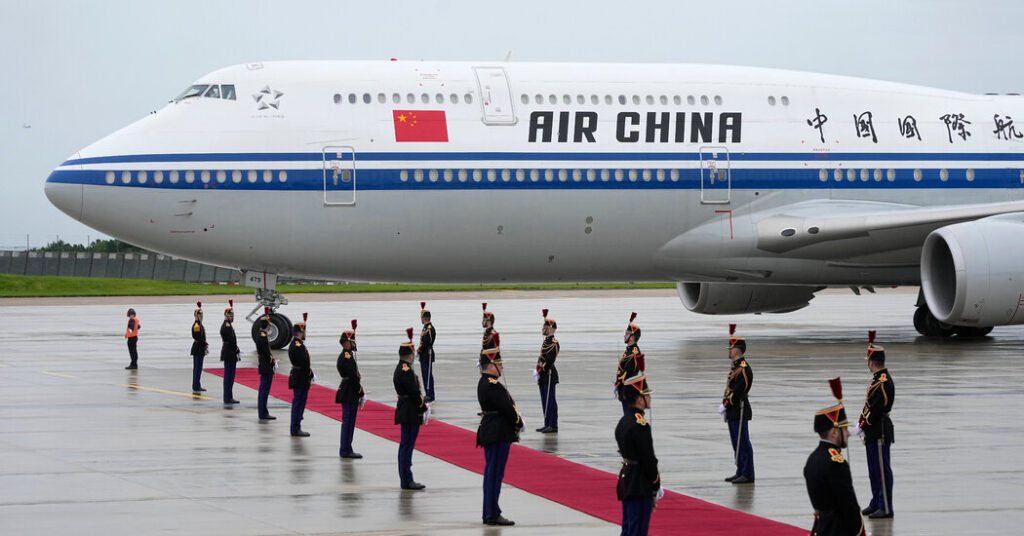This week, Chinese President Xi Jinping visited Europe for the first time in five years, stopping in France, Serbia and Hungary.
Xi’s trip comes amid tensions with many European countries over China’s support for Russia over its war in Ukraine, trade practices and apparent espionage. The trip will also test Europe’s delicate balance between China and the United States.
Xi Jinping hopes to head off a trade war with the European Union as friction intensifies over China’s electric vehicle exports and European companies lose market access in China. Xi will also encourage French President Emmanuel Macron to seek greater autonomy from the United States to reduce Washington’s global dominance.
Here’s what we know about Xi Jinping’s visit, which begins Sunday.
What is the significance of Xi Jinping’s trip?
Experts say the three countries Xi Jinping will visit all support China’s efforts to redefine the global order to varying degrees. All question the U.S. postwar world order to some extent and are eager to strengthen ties with Beijing.
Hungary has close ties with China and is keen to attract Chinese investment in areas such as electric vehicle and battery manufacturing as Chinese manufacturers expand outside Asia. Serbia also has close ties with Beijing and has received billions of dollars in Chinese investment.
Xi Jinping’s first stop is France, where Macron recently said that Europe “must not become a vassal of the United States” and viewed France as a bridge between the “Southern Hemisphere” and Western powers.
Despite Macron’s overtures to Beijing, he said he remained closer to his ally the United States than to China.
He said in an interview with “The”: “I would rather choose a relationship with the United States and a relationship with China than to have one of the two parties impose on me, either pushing me in one direction or pulling me in the other direction. . But, he added: “Obviously, we are not equal. We are allies of the Americans.
Ahead of Xi Jinping’s visit, Chinese diplomats expressed hope that France-China relations would be at the forefront of China’s relations with the West.
Ursula von der Leyen, president of the European Commission, the EU’s executive arm, attended talks with Xi Jinping and Macron in Paris on Monday.
This year is also a year of symbolic significance for China and the three countries.
This year marks the 60th anniversary of the establishment of diplomatic relations between China and France and the 75th anniversary of the establishment of diplomatic relations between China and Hungary.
This year also marks the 25th anniversary of the NATO bombing of the Chinese Embassy in Belgrade, Serbia, during the Kosovo War, which killed three Chinese journalists and sparked angry protests at the U.S. Embassy in Beijing. Chinese authorities continue to view the bombing as a sign of NATO aggression and an example of Russia having reason to feel threatened before deciding to invade Ukraine.
When was the last time Xi Jinping visited Europe?
Xi Jinping last visited Europe in 2019, before the coronavirus pandemic, and spent time in China before leaving the country’s borders for the first time in autumn 2022.
The 2019 visit included a grand ceremony in Rome to celebrate Italy’s participation in China’s Belt and Road global infrastructure project, which aims to expand China’s overseas influence. France rolled out the red carpet for Xi Jinping in Paris and signed more than a dozen commercial and government treaties worth billions of euros, despite Macron’s warning that “China exploits our differences” and that “Europe’s naivety has exceeded .
Xi Jinping also visited Greece and pledged support for the country’s fight with Britain over the Parthenon sculptures (Elgin Marble reliefs).
What is the relationship between Europe and China?
Since Xi Jinping’s last visit, the rift between China and much of Europe has widened. The coronavirus pandemic, Beijing’s embrace of Russia and its crackdown on ethnic minorities, as well as a surge in Chinese exports, have sparked a backlash against China in many European countries.
China has quadrupled its car shipments to foreign markets in recent years, and the European Union has recently adopted a more confrontational tone toward China’s trade practices. EU authorities have launched an investigation that could lead to restrictions on Chinese solar exports and have taken initial steps to restrict trade with Chinese goods including electric vehicles, wind turbines and medical equipment.
Italy has also told China that it will no longer participate in the Belt and Road Initiative. Last month, six people in Europe were accused of spying for China within a week, indicating that European countries are stepping up their response to espionage against China.
Meanwhile, European countries have different views on how to engage with Beijing and benefit from economic opportunities there, with some worried about imposing European tariffs.
Mr Macron and German Chancellor Olaf Scholz also believe China’s influence is crucial to ending the war in Ukraine.
David Pearson reports from Hong Kong, and Aurelien Breeden From Paris.

